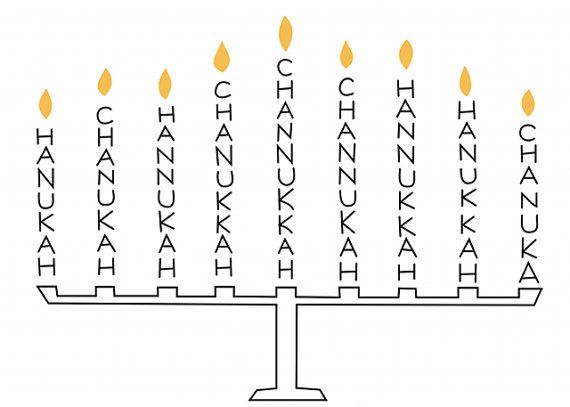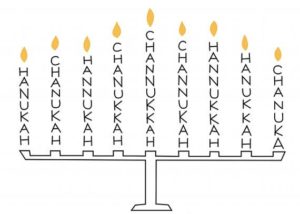

Hanukkah (Hebrew: חֲנֻכָּה, usually spelled חנוכה pronounced [χanuˈka] in Modern Hebrew, also romanized as Chanukah or Chanuka), also known as the Festival of Lights, is an eight-day Jewish holiday commemorating the re-dedication of the Holy Temple (the Second Temple) in Jerusalem at the time of the Maccabean Revolt of the 2nd century BCE. Hanukkah is observed for eight nights and days, starting on the 25th day of Kislev according to the Hebrew calendar, which may occur at any time from late November to late December in the Gregorian calendar.
Did you know these facts?
- Hanukkah is not considered a significant religious holiday.
- The menorah holds nine candles. The center candle is the shamus or servant. It is used to light the 8 Hanukkah candles.
- The Hanukkah candles are strictly for pleasure. They are not to be utilized for any useful or productive purpose. The shamus is available, so the Hanukkah candles aren’t accidentally used to light a fire in the fireplace or another useful purpose.
- Gift giving is not traditionally a part of the Hanukkah holiday.
- Playing dreidel is a gambling game popular during the Hanukkah holiday.
- Fried foods are traditional during the holiday, representing the oil used to light the lamps
HISTORY
During the time of Alexander the Great, Jewish culture began to blend with the Greek culture. Jews who accepted Greek culture at the expense of their religion became known as Hellenists. Alexander and the Jews had a mostly peaceful relationship; the Jews were loyal to his rule, and Alexander didn’t destroy and abuse them.
Around 190 BCE when Alexander left Israel, and Antiochus IV took over, most Jews had assimilated to Greek culture but continued to practice their faith. This was not sufficient for Antiochus.
He began to force the Greek culture on the devout Jewish people by placing Hellenistic priests in the Temple and desecrating it by sacrificing pigs at the alter, prohibiting Jews from practicing their faith, killing their faithful and levying heavy taxes upon them.
A rebel force of Jews formed around the year 166 BCE. They revolted against Antiochus’ government and took back the Temple.
In order to rededicate the Temple, oil was needed for the menorah, but there was only enough undefiled oil to last one night. It miraculously lasted eight days. Hanukkah is the eight-day Festival of Lights commemorating this miracle of the oil.

It is also the day Father Christmas, Sinterklaas, Saint Nicholas or Santa Claus take off on his journey delivering gifts around the world.
HOW TO OBSERVE
Some people open presents on this day rather than Christmas. Leave out some milk and cookies for Santa.
HISTORY
Hearkening back to 16th century when Christian traditions were first influenced by winter solstice celebrations, decorating and preparing for Christmas Day took place the evening before. This included putting up the tree, decorating with mistletoe and holly, bringing in the Yule log and making dishes for the Christmas meal.
Jewish traditions have historically influenced Christian practices. One such practice is that the church day traditionally begins in the evening. Christian churches have celebrated Christmas Eve in part because it is believed that Jesus was born at midnight. Many churches today hold Christmas Eve services or Midnight Masses. They may also hold candlelight vigils, Nativity productions or sing carols.












